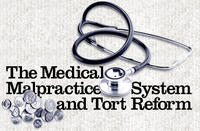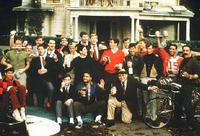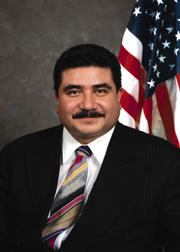 In the spirit of a free exchange of ideas, I am happy to welcome Ed Murnane, President of the Illinois Civil Justice League
In the spirit of a free exchange of ideas, I am happy to welcome Ed Murnane, President of the Illinois Civil Justice League,
as the inaugural Dome-cile House Guest. Ed was gracious enough to take the time to share his thoughts here and I appreciate the discourse.
I must admit that the harsh anti-business rhetoric expressed during the past few days (post-med-mal signing) is disturbing; nevertheless I welcome Rep. Fritchey’s invitation to post some thoughts and comments from the tort reform “establishment” in Illinois. (I also must take the opportunity to commend Rep. Fritchey for providing his constituents – indeed all Illinoisans – with a chance to tell him when they think he’s gone way over the edge, or maybe done something good, too.)
But first a word about the business community in general, and Chambers of Commerce (U.S. and others) in particular.
How easy it is to target “big business.” How easy it is for some to forget that it is “big businesses,” many of them in Illinois, that provide jobs for thousands of Illinois working men and women. They provide tax revenues that support local schools and municipal services; they provide paychecks that are spent in local grocery stores and dry cleaners and churches.
And for those who are looking toward retirement, they provide investment opportunities through mutual funds and 401k programs and pensions that may yield healthy returns if – IF – the businesses can remain profitable.
So don’t be so quick to criticize “big business” or the members of the U.S. Chamber of Commerce. All of us need them and we need them to be healthy.
A disturbing trend in Illinois is that the number of manufacturing jobs has been surpassed by the number of people working for government, as of 2002. According to the Illinois Department of Employment Security. In 2002, Illinois manufacturers employed 740,200 people compared to 863,000 government jobs. Who puts the money into the government to pay those salaries?
But more to the issue at hand: tort reform (even we “tort reformers” would prefer “civil justice reform” since only lawyers, law students and French pastry chefs know what a tort (or torte) is.
Contrary to what some of Rep. Fritchey’s closest allies may believe (and perhaps Rep. Fritchey himself?), the Illinois Civil Justice League is not about “big business.” Although we work closely with the U.S. Chamber of Commerce and the Illinois Chamber of Commerce, we also work closely with not-for-profit organizations and local governments and health care providers (including individual doctors, as well as the Illinois State Medical Society and Illinois Hospital Association).
Local governments are strong supporters of civil justice reform because they are frequent targets of lawsuits – some/many might be considered frivolous – and the local governments would like to keep those costs down. They’re an easy target, unfortunately, because they CAN raise more money by increasing taxes, which several in the Chicago area have had to do to fulfill settlements or verdicts in personal injury cases.
Not-for-profit organizations are threatened by lawsuits, and thus by higher liability insurance costs, and so many of them have joined with us to try to reduce the costs and threat of needless litigation.
This is not a News Flash, but there are some in Illinois who did not like the medical liability reform bill signed last week by Governor Blagojevich. As a matter of fact, they included the governor himself (and Rep. Fritchey, as he has subtly indicated).
We hope the new law and the cap on damages helps cut the cost of medical liability in Illinois. There are as many state results in which “caps” have worked as those in which they have not, which is a frequent argument of the opponents of reform.
But one of the most convincing arguments we have seen in favor of the need for reform and reducing the number of lawsuits in Illinois – especially in Southern Illinois – was the result of an analysis the Illinois Civil Justice League did of EVERY medical malpractice suit filed in Madison and St. Clair Counties in 2000, 2001, 2002, and 2003. Our study of actual court records showed that more than half of the physicians in those two counties had been named in a medical malpractice suit (either individually or through their practice) during that four-year period.
And we also learned from the court records that more than 75% of those who were named were eventually dismissed from the suit and had no obligation to pay anything. Of course they had to pay legal fees, or their insurer did, and they had to take time away from patients to prepare and give depositions, and they had to live with the chilling effect of knowing that any kind of care they give a patient could possibly result in another costly lawsuit.
If the new law helps reduce the number of lawsuits, that will be a plus for patients and for doctors.
Here are three other civil justice reform proposals which make sense. They do not preclude anyone from filing a lawsuit; they do not limit what could be recovered; they should have the support of both sides of the civil justice reform issue.
Venue Reform: Lawsuits should be filed where they make sense, either where the incident happened, or where the plaintiff lives, or where the “wrong-doer” is located. They should not be allowed in a jurisdiction simply because the judges are friendly.
Consumer Fraud Act Jury Option: Illinois’ consumer fraud act should be amended to allow jury trials at the request of either plaintiff or defendant. All of us believe in the right to a trial by jury – don’t we?
Jury Service Reform: Citizens need to be encouraged to serve on juries. One way to do that is to compensate them more than the $15 to $20 per day they are paid in most counties – not enough for parking in some areas. Employers need to be encourage do allow employees to serve and there should be no job risk to the employee.
How could anyone in Illinois oppose the concepts of fair treatment of jurors, trial by juries in consumer fraud cases, and no “forum shopping” for friendly judges?
Just watch.
 Carol Marin gives her take on the pressures mounting on former Governor Ryan as his trial date quickly approaches. After a cursory discussion of the issue, and the pressures that can be, and have been, applied by the feds, she says - "It's over."
Carol Marin gives her take on the pressures mounting on former Governor Ryan as his trial date quickly approaches. After a cursory discussion of the issue, and the pressures that can be, and have been, applied by the feds, she says - "It's over."





















